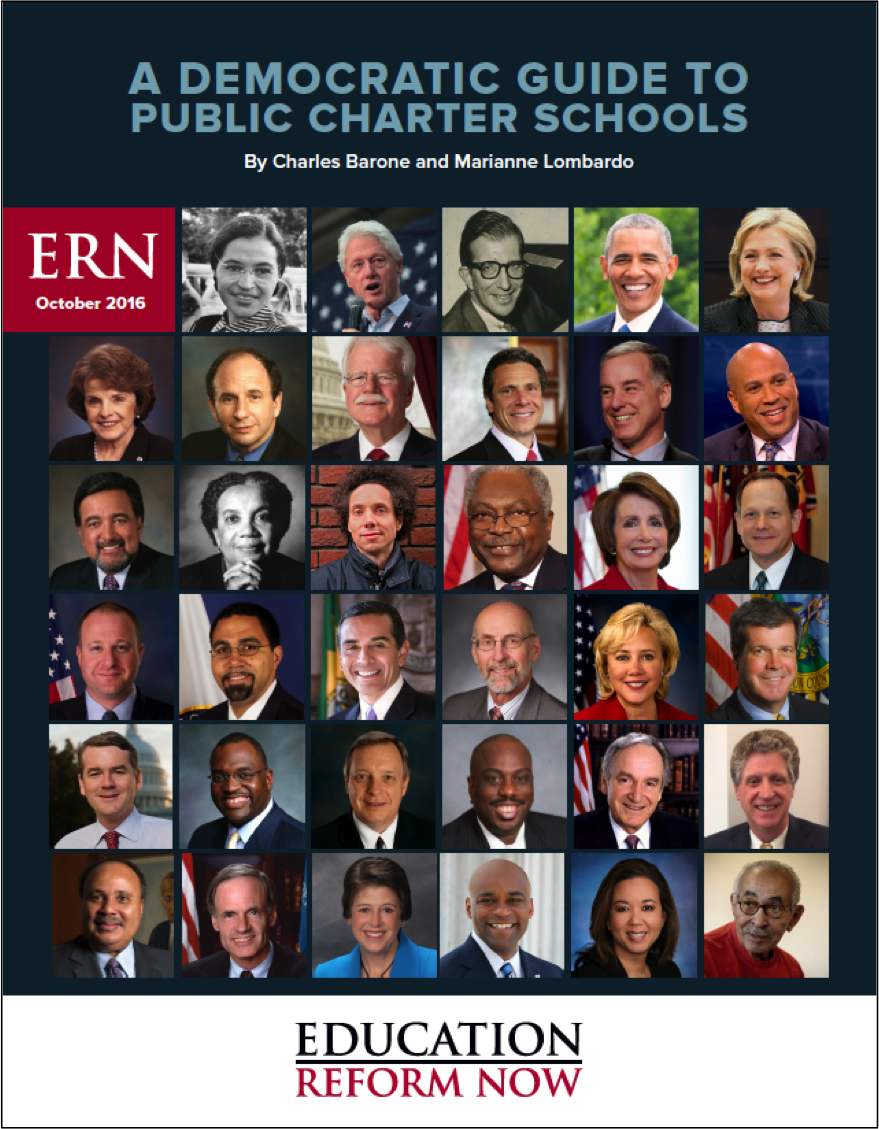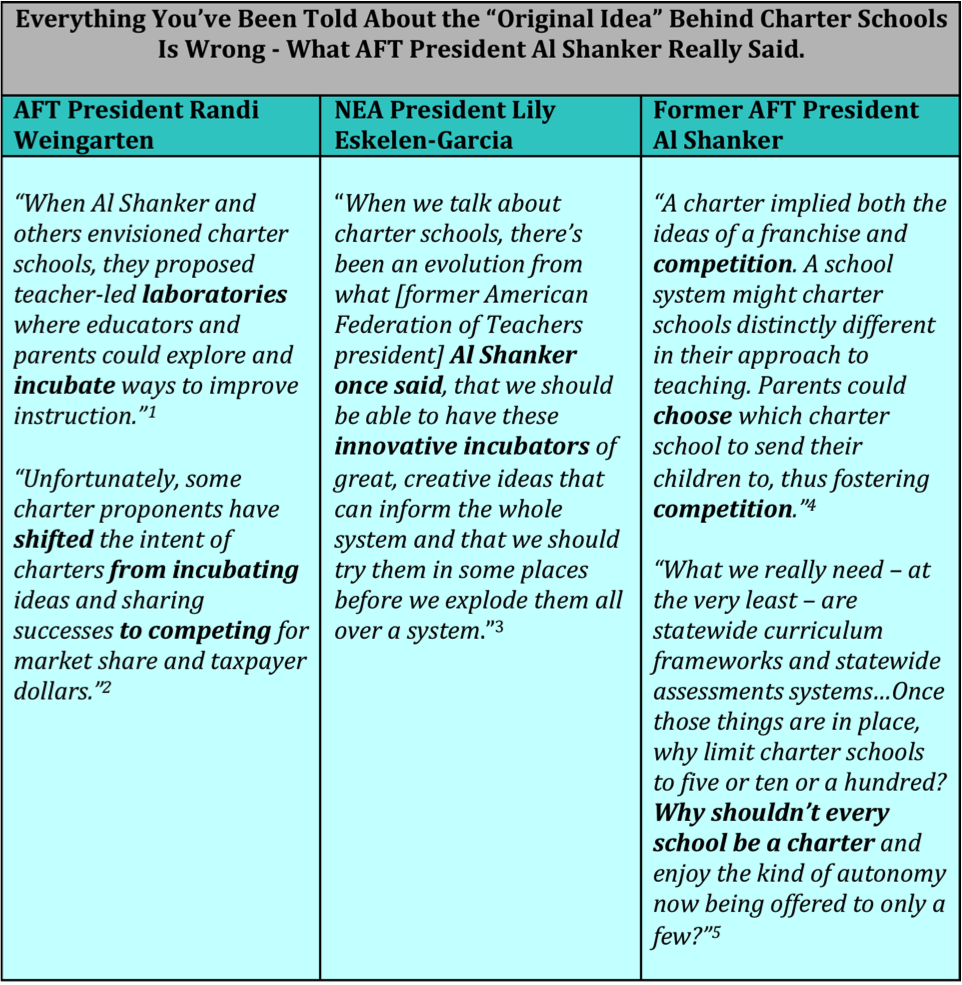By Charles Barone and Marianne Lombardo
Today we’re issuing an issue brief we’ve called “A Democratic Guide to Public Charter Schools.”
This issue brief offers a reminder that throughout their history, public charter schools have had strong roots in progressivism and that the current public charter school sector, on the whole, reflects Democratic values of equalizing opportunity and empowering local communities.
In this issue brief, we show that:
- Civil rights and labor leaders advanced the ideas and principles underlying the charter school model. Despite claims to the contrary, early charter school proponent and former AFT President Al Shanker liked the ideas of choice and competition. And far from seeing charters as being limited to mere “laboratories,” Shanker saw no problem with every school being a charter. (See table below).
- Democratic and progressive leaders have been, and remain, among the strongest proponents of high-quality public charter schools. These include: Former President Bill Clinton; President Barack Obama; 2016 Democratic Presidential nominee Hillary Clinton; Children’s Defense Fund Founder Marian Wright Edelman; former Governor of Vermont and Head of the Democratic National Committee, Howard Dean; former Chair of the House Education and Labor Committee George Miller; and, the late-Democratic Senator from Minnesota, Paul Wellstone.
- A solid majority of Democrats supports public charter schools; support is particularly high among Black, Hispanic, and low-income voters and parents. A recent poll found that about 6 in 10 Democrats who expressed an opinion support public charter schools. Levels of support are even higher among key Democratic constituencies: 61% of African Americans and 64% of Hispanic Americans support public charter schools.
- Charter enrollment is highest in Democratic strongholds. Democratic mayors preside over all 6 cities with districts that have 40% or more students attending public charter schools and 9 of the top 10 cities with districts having the highest enrollment of charter school students. Democrats make up 82% of those members of Congress representing all or part of the 10 school districts with the highest number of students enrolled in public charter schools.
- Public charter schools serve the Democratic goals of equalizing educational opportunities. Students in urban charter schools gain, on average, 40 additional days of learning in math and 28 additional days in reading each year as compared to their peers in traditional public schools, according to the 2015 Stanford CREDO study.
Not all charters perform well. Being a progressive charter school supporter, however, means not having to adhere to any orthodoxy that school autonomy or choice are “magic bullets” for improving public education. It means not having to unqualifiedly defend the charter school sector in states or districts where public charter schools underperform or in cases where individual charter schools misuse public funds. It allows debate and criticism where individual charter schools engage in questionable practices.
There’s much, much more. Happy reading, and do send your questions and comments.
Charles Barone is Policy Director at Education Reform Now (ERN) and Democrats for Education Reform (DFER). A Capitol Hill veteran, Barone was a top education advisor to the late Senator Paul Simon (D-IL) and to Congressman George Miller (D-CA), under whom he acted as lead negotiator for House Democrats on the No Child Left Behind Act of 2001. Before his entry into Washington politics, Charles was a postdoctoral fellow in the department of psychology at Yale University. He has a doctorate in clinical/community psychology from the University of Maryland, College Park.
Marianne Lombardo is a Policy Analyst at DFER and ERN. Marianne developed, administered and evaluated educational programs at the Ohio Board of Regents and the Ohio Department of Youth Services, and was Vice President for Research for the Ohio Alliance for Public Charter Schools. She has expert knowledge of school accountability and education reform, served on Promise Neighborhood, I3, RttT and PCSP panels, and volunteers her time as a parent advocate. She was a MoveOn Field Organizer for the Kerry and Obama campaigns, and has a Masters degree in Sociology from the Ohio State University.
[1] AFT’s Weingarten and Johnson on NAACP Charter School Resolution Saturday, October 15, 2016 http://www.aft.org/press-release/afts-weingarten-and-johnson-naacp-charter-school-resolution
[2] Weingarten, Randi. “Charter Schools as Incubators or Charter Schools Inc.?” The American Federation for Teachers, November 15, 2015. http://www.aft.org/column/charter-schools-incubators-or-charter-schools-inc
[3] Cohen, R.M., Q&A: The Education Stakes in Election 2016, A conversation with NEA President Lily Eskelsen García on what 2016 means for K-12 education, The American Prospect, July 28, 2016. http://prospect.org/article/qa-education-stakes-election-2016
[4] Shanker, Albert. “Convention Plots a New Course: A Charter for Change,” Where We Stand, New York Times, July 10, 1988. Available at: http://source.nysut.org/weblink7/DocView.aspx?id=1886
[5] Shanker, Albert. “Every School a Charter,” Where We Stand, New York Times, December 11, 1994. Available at: http://source.nysut.org/weblink7/DocView.aspx?id=966

